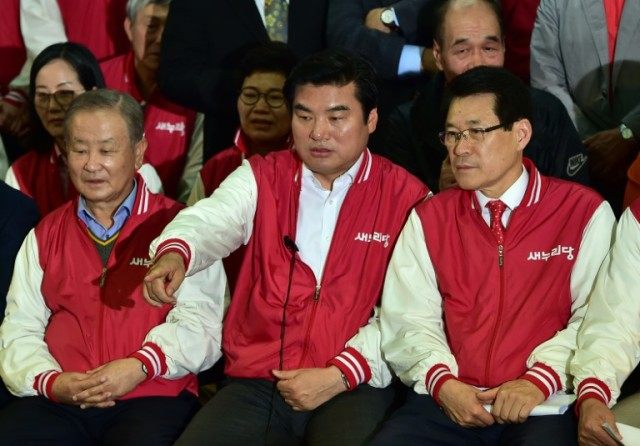Seoul (AFP) – South Korea’s conservative ruling party said it had “disappointed” voters after it suffered a serious setback in Wednesday’s general election, losing its 16 years of parliamentary majority.
The elections, clouded by North Korean nuclear threats and the multiple challenges facing Asia’s fourth largest economy, came as President Park Geun-Hye enters the final stretch of her term in office.
With more than 90 percent of ballots counted, Park’s Saenuri Party was predicted to win 124 seats in the 300-member National Assembly, Yonhap news agency said.
That leaves the party shy of the crucial 60 percent majority that would have allowed it to override opposition attempts to block legislation in the new assembly, making Park very much a lame duck.
“The Saenuri Party humbly accepts the election results and voters’ choice,” party spokesman Ahn Hyung-Hwan told journalists.
“The people are deeply disappointed with us, but we’ve failed to read their mind,” he added.
The left-leaning main opposition Minjoo Party was projected to secure 121 seats and the splinter opposition People’s Party was predicted to bag 39 spots.
It marked the first time in 16 years the conservative party has lost control of parliament, with the three opposition parties tipped to win a combined 165 seats, well over the majority.
Voter turnout was 58 percent, up 3.8 percentage points from the 2012 election, and final official results were expected Thursday morning.
– ‘Fed up’ –
“This is a voters’ judgement against President Park. Many voters are fed up with her authoritarian style of administration”, Professor Yang Moo-Jin of the University of North Korean Studies told AFP.
Park has also fallen short on most of her key economic promises, a failure she puts down to legislative inaction.
But critics accuse her of skewed priorities, poor decision-making and a dogmatic style of leadership.
Political power in South Korea is firmly concentrated in the presidency, with incumbents limited to a single five-year term.
Dissatisfaction is especially high among young people, with the jobless rate among those aged 15-29 at record levels.
The left-wing opposition sought to frame Wednesday’s vote as a referendum on Park’s economic policies. But it has suffered from factional infighting and breakaways that threaten to split the liberal vote.
Kate Kim, an unemployed 25-year-old college graduate, said crippling levels of joblessness had persuaded her and many of her previously apathetic friends to vote.
“This is the first time I have voted… our country desperately needs change, especially for young and jobless people like me,” Kim said.
– Tensions with the North –
Analysts had earlier predicted a majority for Saenuri, saying its prospects would be boosted by surging military tensions on the divided peninsula.
The North conducted its fourth nuclear test in January, followed a month later by a long-range rocket launch that was widely seen as a disguised ballistic missile test.
Tensions are also high over an ongoing major US-South Korean military exercise, which the North sees as a rehearsal for invasion.
Seoul businessman Chung Hae-Young said he voted for Saenuri because of its hardline stance towards Pyongyang.
“I like how the party handled the North, although it honestly hasn’t done a good job with the economy,” said the 60-year-old.
But the conservatives have also suffered from internal bickering, particularly over the process for nominating candidates, which led to a number of defections by MPs now running as independents.
The outcome of Wednesday’s vote could have a significant impact on Park, who has less than two years left of her term.
Under her presidency, annual economic growth has averaged around 2.9 percent compared to 3.2 percent under her predecessor Lee Myung-Bak.
Exports, which account for more than half of GDP, have fallen for the past 14 months consecutively, while household debt has soared to a record $1.0 trillion.

COMMENTS
Please let us know if you're having issues with commenting.